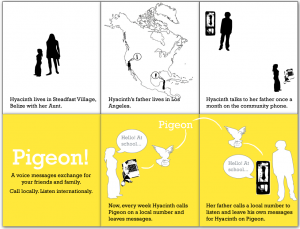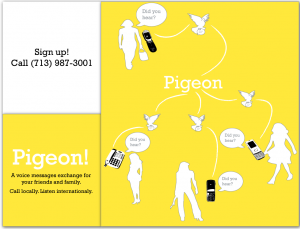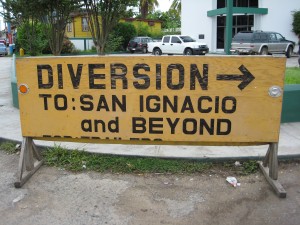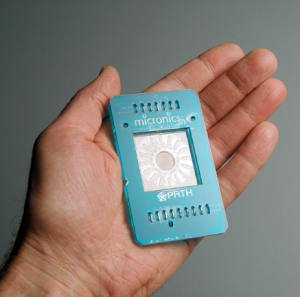Archive for June, 2008
“The World is Flat 3.0″ Thomas Friedman
This talk of Friedman’s from 2007 summaries up much of his thoughts about globalization from his book The World is Flat. It seemed worthwhile to watch as it provides the context for much of the general public about technology in emerging nations.
Friedman talks of 3 eras of globalization:
- Globalization 1.0 1492-early 1800 (large to medium, countries went global)
- Globalization 2.0 early 1800s-2000s (medium to small, spearheaded by companies for market and labor)
- Globalization 3.0 2000-present (small to tiny, spearheaded by individuals)
Friedman asserts that ideas, especially ideas about technology, are now widely distributed by individuals and that this impact will only continue.
available on iTunesU - “The World is Flat 3.0“
“Design, Innovation and Leadership” - Carole Bilson
“Design, Innovation and Leadership” podcast from the University of Michigan Penny W. Stamps Distinguished Visitors Series
Response: There’s not that much here for me. Bilson thought that designers could make a bigger impact in companies and wanted to prove it. It’s mostly corporate ideas. Bilson works for an mailing documents company, and one perhaps interesting thing brought to my attention was the use of indicia, which I thought might have some vauge connection to mobile banking.
Where I’m coming from
This is a re-post of my wrap-up of my mini-thesis last semester, Pigeon. You can find it and the process leading up to it on the Computation08 blog. Perhaps Pigeon is the right place for me to move forward, but I’m going to try to prototype outside of it a bit more.
In an attempt to facilitate communication between people with limited technological access through the creation of an experimental phone-based social network, Pigeon was created. Pigeon is a voice message exchange system for friends and family. The idea of this project began with a desire to connect loved ones who live far away and are unable to communicate as often as they might desire, such as a young girl who lives in Belize and her father who lives in Los Angeles, working several jobs to send money back home to their family, who can only communicate with an international call once a month. The Pigeon concept provides an interesting idea for asynchronous phone-based message exchange, which has the potential to bridge communication barriers by employing accessible and affordable communication technology as a means for individual to tell their personal story, or what is currently happening in their life.
You can call in and interact with the current version of Pigeon: (713) 987-3001. Use member number 999-999-999 and PIN 9999. After logging on, options 1 (listen to message), 2 (record a message), and 6 (record Pigeon name, which is the system identifier, like a Facebook picture) are active.
Print materials, which in a comic/storyboard form explain Pigeon and it’s features. They are designed to be folded up and attached to “phone cards”:
For more information, see the presentation, an interactive quicktime.
I’m living in San Igancio for the next month
From Design and the Elastic Mind
Amida Simputer is a simple handheld computer for use in developing regions. It has multiple UI options, takes handwriting input, and is multilingual.
Lab-on-a-card is diagnostic device for use by health care workers with little training. It quickly tests for enteric infection. They’re also working on cards to test for sexually transmitted diseases and fever illnesses.
Text free user interfaces aims to make computer usage accessible for those who are non-literate (from Microsoft India, see previous post).
Microsoft India
Need to spend some time looking at Microsoft’s Research team in India, specifically their Technology for Emerging Markets, even more specifically:
- Financial service delivery to the poor and technology - which is looking into how those who live in poverty access financial services
- Warana unwired - which replaced PCs with phones using an SMS gateway for a rural sugarcane coop
- The use of ICTs by small and informal businesses - which looking into information and communication habits of micro-businesses (businesses with less than 5 people)
- The digital studyhall - which is “Netflix + YouTube + Kazaa”
Jan Chipchase, “Our cell phones, ourselves”
Response:
I’ve been interested in Chipchase and his work for some time now. His blog is available at www.janchipchase.com. This talk sums up lots of his work.
The most important thing that Chipchase talks about, for me, is how a cell phone becomes a source of identity in a mobile world. I’ve certainly have always felt a connection to those that matter to me carrying different phones with the same phone number since I was 15. I think it has certainly allowed me to travel more freely and with less worry. I wonder if mobile phones enable people or kids to travel outside of their village with more confidence than they would have before. In St. Lucia I was told kids get their cell phones during their early teen years. I think this is less prevalent in Belize, but I want to do some asking around about it.
Chipchase also brings up mobile banking and emphasizes the idea of every phone as an ATM. This, he says, is particularly important for people who may not have enough money to be considered a viable customer for a bank. Banks are extremely tedious to use here in Belize in my experience. Lines are long and there’s lots of checking with higher-ups for approval. I wonder how the immediacy and connivence of using a phone as a source of money will change accepted banking practices.
Lastly, Chipchase talks about how the things we carry are designed to meet our most basic needs and desires; we carry keys, money, and phones giving us access to shelter, food, and “an ability to transcend space and time” or to be able to communicate with people that are far away. Keeping in mind these basic needs seems will be an important litmus test in prototyping.
Notes:
planet earth: 6.3 billion
cell phone connected: 3.3 billion
- “What do you carry?”
- keys, money, and mobile phones are the big ones
- Why keys, money and mobile phones?
- for survival for us and our cell phone
- these are at the bottom rungs of Maslow’s Hierarchy of Needs
- phones help you transcend space and time
- but a mobile phone is personal and convenient
- but humans forget
- point of reflection- the pocket tap moment
- center of gravity- where you keep these objects
- 799 million illiterate in 2004
- if you can’t read and write you need a way to manage contact information
- illiterate people are masters of delegation, they ask others to do it
- Ugana- sente, means ‘money’ or ‘to send money as air time’ - buy a prepaid card, read number to village phone operator, operator takes commission and then passes the rest in cash to another person
- this turns everyone’s phone into an ATM
- this is very elegantly designed and in tune with local need
- difference here from grameen, etc., is that there is no central authority
-phone numbers written above a house instead of house numbers
- people’s identities are mobile with a mobile phone.
- What will it be like when everyone is connected?
1. The immediacy of ideas.
2. The immediacy of objects.
3. The street will innovate beyond intention
4. Conversations and our ability to listen. With more people connected more people want to be a part of the conversation.
Domain exploration
This is some beginning brainstorming.
Questions
- What can technology do to help the lives of people living in poverty?
- How can people be helped to communicate more easily who have little access to technology?
- How do technological solutions differ for people living in developing nations from those for people living in developed nations? Where are overlaps?
- How can technology help with income generation?
- Is a sustainable non-loss business the way to most effectively create a sustainable business model for integrating technological solutions or are for-profit/non-profit models better?
- How can cell phones be used in new ways in developing contexts, as they are more readily accessible than computers?
- How can mobile banking be streamlined, more useful, and more accessible?
- Is voice (phone) based internet actually useful for people who can’t get on the visual web?
- What types of things must be rethought when information is spoken instead of seen?
- What are the implications of an auditory web for the illiterate?
General, larger questions:
- Is it better to create a larger more applicable system or to create something for a specific context for empowerment?
- A currently held popular model for development, and the model which I’ve believed in, is for a solution to be developed on the ground in partnership with a specific group. How do you bring innovative ideas into a context like this?
Motivations
To improve the quality of life of people living in developing countries.
To create a solution that can be economically integrated, allowing both the solution’s application to be of help but for market forces to make the solution sustainable.
To use simple technology for greater income generation allowing people to be lifted out of the cycle of poverty.
To not forget ecological impacts of these technological solutions.
Domains
poverty alleviation - communication - mobile technology - auditory internet
Target group?
Caribbean areas of high poverty, specifically Belize and St. Lucia.
An observation and thoughts
Observation: since I was last in Belize, cell phone carriers have begun directly depositing pre-paid phone credit via electronic means versus selling phone cards. There are even promotions to encourage this exchange (10% extra credit if you do it this way). This seems like they’re priming to get people more and more used to their phone as a device for trading money, for mobile banking.
I want to perhaps get in touch with Galen University, a private university here in Belize, to see if anyone has particular interest in sustainable development, technology, and Belize/the Caribbean.
Development/Caribbean Research groups:
- Society for Caribbean Studies, UK
- International Association of Science and Technology for Development
- Caribbean Studies Association
Also, I bought drewcogbill.com today!
Eric Brewer, “Technology for Developing Nations”
Technology for Developing Nations (1 December, 2006)
Eric Brewer, UC Berkley - TIER, TIER blog
Response: Most important ideas for me from Brewer: non-loss business, co-development, wifi for bootstraping.
Notes:
- Technology can make a difference
- Advocates for focusing on the rural poor and urban slums, as urban areas are moving forward due to market forces
- Development is: governance and technology
- Bringing wireless technology to an area can bootstrap on other infrastructure
- Wireless infrastructure is incredibly affordable, only dirt roads are cheaper
- non-loss business - sustainable but not profit generating business
- Technology solutions can be franchised from a third party loan to create a non-loss business
- River Blindness, Black Fly eliminator - used sensors to look for areas prime for black fly and sprayed - protects 30 million people from infection and makes 100,000 square miles now viable for farming
- Poor people spend lots of money, and even the poorest have a little disposable income, and they spend money on entertainment and communication, 7% of income in rural Bangladesh spent on telephony
- Mentions that technology could help in long distance money transfer ***
- Grameen Bank, Bangladesh- micro-loaning, began when noticed that poor friends paid back their small loans
- Grameen Telecom- microloans for village phones, a mobile phone woman in each village, a “super pay phone”
- Scaled with micro-finance- (***phone based money transfer, micro-financed, franchised)
- Make some project in the first six months, make shorter-term plans. 5 year plans are not ok with technology; things change too quickly.
- Develop something with a group and deploy- co-develop, co-deploy
- They have a $50 board to make a more efficient solar system
- Working mostly on long-distance wireless
- Mainly employed with rural telemedicine with rural eye clinics in India.
- These clinics serve areas without doctors. They doctor video conferences in and tells patients things after conferencing with a ‘nurse’
- They get people to go get cataract surgery
- They’ve made these clinics scalable, they’re deploying 50 more
Literacy
- Voice is a big part of developing nation communication
- there has been no work on voice recognition for many languages
- Instead of goings at it typically, they’re going to do sound recognition - won’t work with translation but will perhaps work with user interface interaction
- Make the recognizer context sensitive, minimize the legitimate words that can come in
- They’re recognizing digits well with this method
- How do you get training data from illiterate people? Using fingers to get people to say them, make people comfortable, use locals to interview, use a phone versus a microphone
Education
- cell phone game to teach english
Paper mentioned to look up: “The Case for Technology for Developing Regions” - E. Brewer et al. IEEE Computer, June 2005




